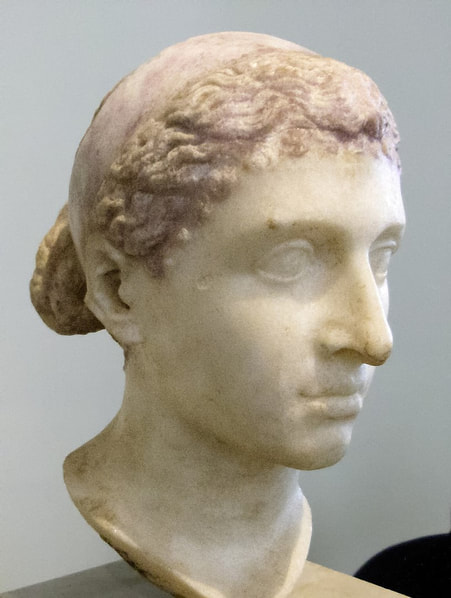 The Berlin Cleopatra, a Roman sculpture of Cleopatra wearing a royal diadem, mid-1st century BC (around the time of her visits to Rome in 46–44 BC), discovered in an Italian villa along the Via Appia and now located in the Altes Museum in Germany. (Source: https://en.wikipedia.org/wiki/Cleopatra#/media/File:Kleopatra-VII.-Altes-Museum-Berlin1.jpg) The ode is among Horace’s most famous, in part because it brings us a contemporary view of a great historical moment, the defeat and death of Cleopatra. But it’s also appreciated because of its surprising shift in tone and point of view: the Romans’ “scornful opprobrium” of Cleopatra’s drunken self-delusions (David Ferry, translator, The Odes of Horace, 10) becomes admiration of her clear-eyed resolution at the end. “Now is the time to drink” is the governing conceit—the Romans' celebration of their victory over the queen drunk on her fantasies becomes Cleopatra’s metaphorical drinking in (conbiberet) of the asp’s venom. The Romans would humiliate her by parading her, a dethroned queen, in a grand triumph; but she chooses her own private victory.
According to Eduard Fraenkel (Horace, Clarendon Press, 1957, 158-161), Cleopatra was "the nation's most dreaded enemy"; and news of the capture of Alexandra and of her death a few weeks later brought joy to the people of Rome. Cleopatra was viewed as a prodigy (monstrum), wonderfully and horribly outside the ordinary. But once "the feeling of horror recedes..., admiration takes its place. At the end of the poem written to celebrate Cleopatra's defeat her greatness dominates over everything else." Here's David Ferry’s translation: At last the day has come for celebration, For dancing and for drinking, bringing out The couches with their images of gods Adorned in preparation for the feast. Before today it would have been wrong to call For the festive Caecuban wine from the vintage bins, It would have been wrong while that besotted queen, With her vile gang of sick polluted creatures, Crazed with hope and drunk with her past successes, Was planning the death and destruction of the empire. But, comrades, she came to and sobered up When not one ship, almost, of all her fleet Escaped unburned, and Caesar saw to it That she was restored from madness to a state Of realistic terror. The way a hawk Chases a frightened dove or as a hunter Chases a hare across the snowy steppes, His galleys chased this fleeing queen, intending To put the monster prodigy into chains And bring her back to Rome. But she desired A nobler fate than that; she did not seek To hide her remnant fleet in a secret harbor; Nor did she, like a woman, quail with fear At the thought of what it is the dagger does. She grew more fierce as she beheld her death. Bravely, as if unmoved, she looked upon The ruins of her palace; bravely reached out, And touched the poison snakes, and picked them up, And handled them, and held them to her so Her heart might drink its fill of their black venom. In truth—no abject woman she—she scorned In triumph to be brought in galleys unqueened Across the seas to Rome to be a show. (David Ferry, The Odes of Horace, p. 71. Farrar, Straus and Giroux. Kindle Edition.) Edited, 18 Oct 2023; 20 Oct 2023; 18 May 2024. Comments? Send them to [email protected]
0 Comments
Leave a Reply. |
AuthorWrite something about yourself. No need to be fancy, just an overview. Archives
July 2024
Categories |
 RSS Feed
RSS Feed